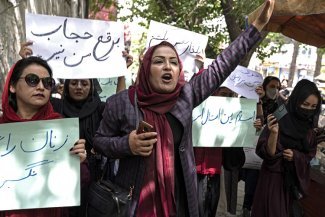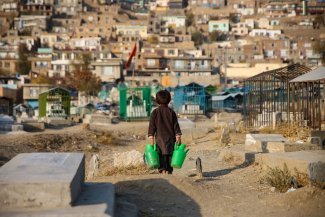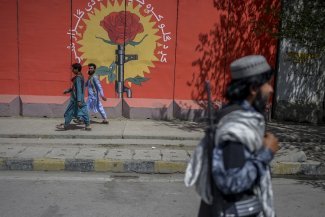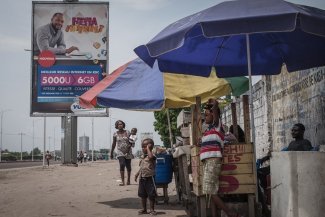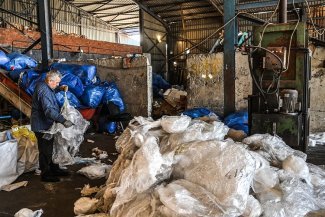The workshop of Khadija Rahimi (not her real name), an Afghan businesswoman who makes and sells artisanal carpets for export from an old boiler room, photographed on May 23 2023. With the Taliban back in power, and tough restrictions on women’s rights in place, many female entrepreneurs have relocated their factories out of sight, into basements and backrooms.
Behind two iron gates and down a narrow, steep flight of stairs, is a basement. Upon entering it, you are hit with the tinny drone of Singer sewing machines, a sound created by six tailors in one of Afghanistan’s secret women-run factories.
When the Taliban returned to power in August 2021, two decades after being ousted by US-led forces, Zahra Shah* was forced to close her atelier in downtown Mazar-i-Sharif, Afghanistan’s fourth largest city, situated in northern Afghanistan. As a precaution, she moved into the basement of a non-descript apartment block on the city’s outskirts. Shah first set up her business ten years ago, with just US$100; today she has 16 employees making her highly sought-after dresses.
But her success has been stymied by events outside of her control. “These days, I sell online, rather than in my atelier. I sell on Instagram. But it isn’t easy,” she says. Online sales require marketing skills that she does not possess, as well as time and resources. Shah says that her revenue has dropped by over half in the last two years, mirroring the economic fate of the rest of the country.
In the first year of Taliban rule, the Afghan economy lost US$5 billion, wiping out the previous ten years of growth. One in three businesses shut down, and women bore the brunt of the crisis, with the number of women in employment dropping by 25 per cent.
But despite the initial outcry of the international community over the Taliban’s severe restrictions on women’s rights, years of gains in gender equality have been reversed by the Islamist government at breakneck speed. For example, women have been banned from studying at universities and working for NGOs, girls’ access to education has been severely restricted, as have women and girls’ access to public health, housing, employment and justice. Following a visit to Afghanistan in May, UN experts described an “extreme situation of institutionalised gender-based discrimination” that is “unparalleled anywhere in the world”.
However, on the ground, Shah says that such words of condemnation do not lead to practical support. “There is so much talk about Afghan women, about solidarity, but practically, the only support you [might] get is a Schengen visa to leave. And what’s the point? I’ve created my own space here. What would I do in Europe? Make Afghan dresses that no one wants to buy?,” she asks. “I will come, but as a designer. Not as a refugee.”
The sanctions are “a disaster”
Mazar-i-Sharif looks as it ever did. Its name means ‘Noble Shrine’, because its famous 15th century Blue Mosque is believed to be the burial site of Ali, the founder of Shia Islam.
Today, the site bustles with pilgrims all day, on all days, but on the streets, there are mostly men. But that doesn’t mean that the women are all at home. Many of them are busy working, quite literally, underground: in basements, in cellars, at the bottom of courtyards, in the backs of offices.
Some of these women run their own businesses, and for those whose businesses have been devastated since the Taliban returned to power, Islamic Relief, a London-based NGO, has offered a helping hand. In partnership with the United Nations Development Programme (UNDP), it recently funded 400 female entrepreneurs with US$1,000 each. This money has been used to restock textiles, or fertilisers. To replace looms, or turn a patch of grass into a vegetable garden, or a storage room into a goldsmith workshop. In essence, women with struggling businesses are being given a way to start again without completely starting over.
The project is part of the wider ABADEI programme, a US$265 million emergency support initiative set up by UNDP in October 2021, designed to help small and micro-businesses from collapsing in Afghanistan, particularly those owned by women. In Dari and Pashto, ‘abadei’ stands for thriving, resilient communities, and as well as helping to support about 50,000 small women-owned businesses with grants, loans and technical assistance, the programme also offers short-term cash-in-hand work for the unemployed as well as temporary basic income for the most vulnerable populations.
But the Taliban is not the only concern of these female entrepreneurs. “For the international media, the issue here is the burqa. But honestly, I just wear my hijab. As before,” says Khadija Rahimi*, the daughter, granddaughter and great-granddaughter of carpet weavers. She trained in Iran and her handmade pieces are bought by customers all over the world.
But these days, Rahimi’s workshop has been relocated to a boiler room, a space far from ideal for artisanal carpets worth thousands of dollars: “My main issue is the banking system. Your sanctions,” she says, pointedly. “You are all focused on Ukraine now, and you have forgotten [about Afghanistan]. But our banking system is blocked. And for me, this has been a disaster.”
Prior to the Taliban takeover in 2021, international aid was a mainstay of the Afghan economy, in addition to foreign direct investment and remittances from the country’s large diaspora.
But the withdrawal of most foreign development support in conjunction with US and EU sanctions that have blocked the country’s central bank from accessing roughly US$9 billion of its foreign reserves has brought the Afghan economy to the brink of collapse.
Shirin Azizi* is another dressmaker who was able to restart trading thanks to the ABADEI project. She has 60 employees and a business partner overseas, but recently, she has found it incredibly difficult to conduct business in Afghanistan. “The other issue, of course, is this obligation now to travel with a man. With a mahram. Especially for my internal trade: because it is mandatory for any trip further than 48 miles, and so meeting buyers and suppliers, going through the pattern books, is complicated,” she tells Equal Times.
“And on top of that, you have to pay cash. You pay with the hawala [an informal money-transfer system]. Or in kind.” It helps traders to bypass barriers but with so many middlemen, it also eats into their profits. “And it’s a loss for all. For the international community too. Because the sanctions are too strict, they are ineffective,” she says. “It makes no sense.”
When is a rule an obligation, or not?
According to Human Rights Watch, “economic shocks have been the primary causes of the deteriorating situation” in Afghanistan. Out of a population of about 40 million people, 28.3 million Afghans are in dire need of humanitarian aid, and according to UNICEF, every day 167 children are dying from preventable diseases. Still, the aid keeps flowing: for 2023, the UN asked for a record US$4.6 billion for Afghanistan. The largest ever appeal for a single country. And yet, with less than 6 per cent of the target met, it is also the most underfunded.
After the Taliban ban on female workers at NGOs and the UN, most international organisations stopped their projects. In theory, this UNDP-Islamic Relief project should not exist. Because only humanitarian aid is allowed – food, blankets, medicines – not development aid. But as with many things in Afghanistan, ABADEI operates in the grey areas. “In the last years, aid covered 75 per cent of the government’s spending. And 40 per cent of the GDP. Our goal is to have Afghans not depending on anyone anymore. That’s what freedom is, too,” says Maryam Hazrat, the economist in charge of the project.
Mazar-i-Sharif is a mass of contradictions – like all of Afghanistan. Its university is open only to male students now, and so are its parks and gyms. But, a gym that welcomes women has reopened, as have some of the girls’ schools, and in the outer areas of the city, women quietly ride bikes.
It is in this context that Halima Ajab* has converted the boxroom of an insurance agent into a kitchen, and behind a plexiglass sheet, she runs the best take-away in town, with nine cooks and a four-page menu. “Basically, you never understand if a rule is an obligation or not. And it might vary from city to city. Or even street to street,” she tells Equal Times. She says that when she first started trading, she was visited by police from the Ministry of Vice and Virtue (which, with a bitter irony, reemerged from what was once the Ministry of Women’s Affairs):
“The Taliban came, and ordered me to shut down. But technically speaking, the law does not forbid women to work; it only says that we should stay at home, unless really necessary. But if I don’t work, how can I make a living? And so I replied that for me, living is really necessary," she says. Then what happened? “Now they are amongst my regulars.”
Jamila Safi* runs a pasta factory emblazoned with a neon sign inside a car park. The virtue police are frequent customers. Despite the many difficulties that she faces, she holds some hope for the future. “Before, we each worked from our home. Because no one remembers now but we had gunfire on every corner,” she says. “The truth is that with the Americans [who had been at war in Afghanistan since it invaded the country following the September 11 attacks in 2001], most of the country only got violence and misery. And that’s where the Taliban come from.”
Safi thinks that all Afghans need to come together to rebuild the country. “We are all Muslim. We all share the same values. And who is supporting us, actually? An NGO called Islamic Relief. Not the CIA,” she says. “We can see it as men and women, Taliban and non-Taliban. Or as mothers and sons, fathers and daughters, brothers and sisters. And talk to each other.” She says with the Taliban, at least some dialogue is possible. “It is not easy, but their door is open. “The UN,” however, “have six-metre-high walls”.
Safi says that she personally thinks that most of the Taliban’s prohibitions are strategic, not ideological. After all, even Suhail Shaheen, the Emirate’s chief spokesperson, has two daughters attending school in Qatar. But because women’s rights are what the world is concerned about, the Taliban is using them as leverage against sanctions. “Of course I want schools to reopen. Like all of us,” she says. “We should not be treated like pawns in a game. But that’s true for you, also.”




